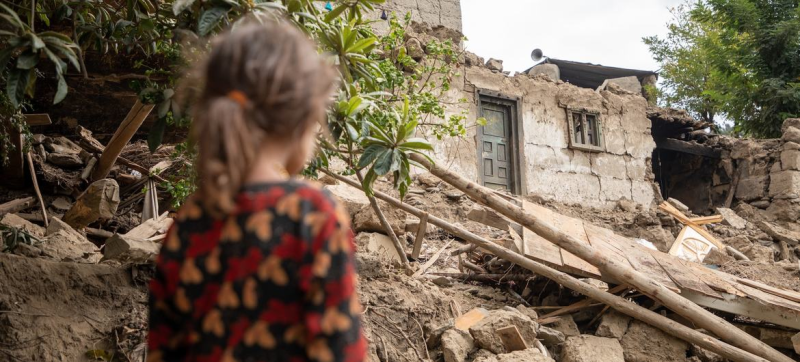- US Faces Pressure as UN Votes on Gaza Ceasefire |
- Prof Yunus includes 4 political leaders in UNGA tour del |
- Tarique calls for vigilance to prevent troubles during Puja |
- Parties divided on constitution order move over July Charter |
- Khulna’s ‘white gold’ shrimp eyes Tk 22,600cr export goal |
UN Warns Afghanistan Faces ‘Perfect Storm’ of Crises

A six-year-old girl looks at the ruins of her home, destroyed in the 31 August earthquake in eastern Afghanistan.
Afghanistan is facing “a perfect storm” of overlapping crises, the UN’s outgoing envoy told the Security Council on Wednesday, as an Afghan women’s rights advocate described Taliban policies as “gender apartheid” that are suffocating an entire generation of girls.
Roza Otunbayeva, the Secretary-General’s Special Representative for Afghanistan, said that although armed conflict has declined since the Taliban takeover in 2021, the humanitarian, economic, and human rights situation has worsened sharply.
“It is an open question whether there is sufficient pragmatism among the de facto authorities to manage this perfect storm of crises, or whether ideology will prevent sustainable solutions,” she warned.
Central to the crisis are sweeping Taliban restrictions on women and girls. Schools for girls above grade six have been closed for four years, costing the economy an estimated $1.4 billion annually, according to the World Bank. A UN Women survey shows most Afghans oppose the bans.
Hanifa Girowal, Vice President of Women’s Rights First, went further, calling the Taliban’s policies “gender persecution” and “gender apartheid.” Speaking for women inside Afghanistan and in exile, she described systematic exclusion as “forced confinement, exclusion and subjugation.”
The UN has provided nearly $13 billion in humanitarian and basic needs aid since 2021, but funding has been cut by almost 50 percent this year. Otunbayeva said restrictions on Afghan women working for NGOs and the UN have severely hindered relief efforts, including earthquake response.
She also warned that Kabul, home to nearly six million people, could become “the first modern city to run out of water” within years. Meanwhile, the poppy cultivation ban, mass deportations from Iran and Pakistan, and slow economic growth have compounded the crisis.
While some positive developments were noted — such as relative stability, a general amnesty, and curbs on torture — both Otunbayeva and Girowal stressed that progress depends on meaningful engagement with the Taliban, alongside clear international benchmarks on women’s rights, education, and humanitarian access.

